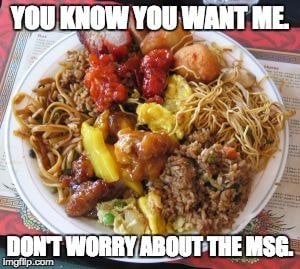Table of Contents (click to expand)
MSG is a salt form of a non-essential amino acid that is found in many different foods and is used as a flavor enhancer and additive. MSG tricks the brain into thinking that what we are eating is delicious, since we experience such pleasure as a result. The effects of MSG on the brain and the body include increased hunger, weight gain, and obesity, all resulting from an appetite that can simply never be satisfied!
Try to think back to the last time you ordered Chinese food. You picked out your items, eagerly waited for them to be delivered and then promptly devoured all of it once the bag arrived at your door. However, despite gorging on every delicious dish, a few hours later, your stomach seems mysteriously empty. Or, at the very least, you are already turning one eye to your pantry for a snack.
Many people are familiar with this sensation, and commonly say, “Well, it’s just the MSG”, but they rarely explain it any further. The question is, what is MSG? Why is it found in Chinese food? And most importantly, does it actually make you hungry?

Short answer: MSG is a salt form of a non-essential amino acid that is found in many different foods and is used as a flavor enhancer and additive, allowing for lower-quality food that still tastes good, and even causing addiction to the substance!
Recommended Video for you:
What Is MSG (Monosodium Glutamate)?
While people commonly associate MSG (monosodium glutamate) with Chinese food, it is actually present in a huge variety of foods, being one of the most popular flavor enhancers in what we eat. It can be found in processed foods, salad dressings, soups and sauces, potato chips, frozen dinners, and dozens of other common items.
Why Is MSG Used In So Many Food Items?
The reason for this MSG obsession is quite obvious. This amino acid is known as an excitotoxin, which causes a massive release of dopamine by the brain, which is the pleasure or satisfaction hormone that makes us feel good. Including MSG in these foods tricks the brain into thinking that what we are eating is delicious, since we experience such pleasure as a result.
The Effects Of MSG On The Brain And The Body
However, that isn’t all that MSG is able to do within the body. The satisfaction of eating such “delicious” food encourages people to continue munching on their food, often far beyond the level of satiety that the body actually craves. MSG does this by blocking the neurotransmitters to the brain that signal we have “eaten our fill”. So, the more food you eat, the more MSG gets into your system, and at this point, MSG’s final trick comes into play.
It stimulates the release of insulin, which increases the rate of fat storage in the body. When the insulin hits your system, your blood sugar level drops dramatically, and your hunger returns. The use of MSG in food has been explained as the food industry’s attempt to counter diet fads and the desire of people so suppress their appetite. In fact, MSG does the exact opposite, ensuring that people will continue buying and consume food, even if it’s not good for them.
This vicious cycle creates something akin to addiction to MSG, meaning that people will keep seeking out foods that deliver such a reaction in the body, just like addiction to any other drug. MSG affects receptors in the brain in a similar way as Valium or similar anti-anxiety drugs. This can lead to weight gain and obesity, all resulting from an appetite that can simply never be satisfied!
However, as mentioned before, MSG is a non-essential amino acid, meaning that the body can make its own, and does so in the necessary quantities for the body to function normally. Adding excess monosodium glutamate to the system causes certain enzymes to form, which can transform excess glutamate into GABA (gamma-aminobutyric acid), which is important for reducing levels of depression, chronic pain and anxiety. However, the presence of this transformative enzyme can be seen by the body as a foreign agent, particularly in people who suffer from diabetes, and antibodies will be sent to destroy it. Unnecessary immune reactions like this one can unnecessarily add stress and inflammation to the body, which is never a good thing.
Dangers Of Consuming Too Much MSG
While making food taste better sounds like a pretty great bonus, particularly if you are on a budget and can’t afford the highest-quality food, there are some definite dangers to eating MSG with abandon. Obviously, if you continue to push your stomach beyond the boundaries of being “full”, you are going to overeat, and those calories and fats will have to go somewhere. The increase of insulin also means that a lot of that is going to be stored as fat. Certain studies have revealed that even in diets that are the same in terms of caloric intake, those who included MSG in the diet were far more likely to be overweight; quite simply, the body is less able to burn calories effectively with MSG in the system.
Some other studies have linked excessive monosodium glutamate levels in the body to kidney and liver damage, and can lead to cardiovascular complications. The fact that MSG is commonly found in low-quality, high-salt foods exacerbates the problem, and can therefore help lead to atherosclerosis, heart attacks and strokes. MSG is an excitotoxin, and studies have even linked these chemicals to brain damage, since they can overstimulate neural receptors for no reason. By exhausting neural receptors, their ability to communicate effectively and send messages accurately. This can increase the risk of many different cognitive disorders, including Alzheimer’s, dementia, lupus, multiple sclerosis and Parkinson’s disease.

With all of that in mind, perhaps you’ll be a bit more careful about the processed foods that you put in your shopping cart, but the truth is, it is nearly impossible to avoid consuming MSG, as it is so widespread in modern society. Buying whole and organically-grown foods will often help you avoid the substance, but a complete elimination from your diet is unlikely. If you are working hard to lose weight – or keep it off – a bit of awareness and checking of food labels can help you significantly reduce your intake of MSG and prevent many of these serious side effects.
After all, food that tastes great is a wonderful treat, but what price are you willing to pay for that delectable General Tsao’s Chicken?
References (click to expand)
- What Exactly is MSG? - www.msgtruth.org
- (1994) Excitotoxins in foods - PubMed. The United States National Library of Medicine
- Freeman, M. (2006, October). Reconsidering the effects of monosodium glutamate: A literature review. Journal of the American Academy of Nurse Practitioners. Wiley.
- (2005) Fact or Fiction? The MSG Controversy - Harvard DASH. Harvard University













